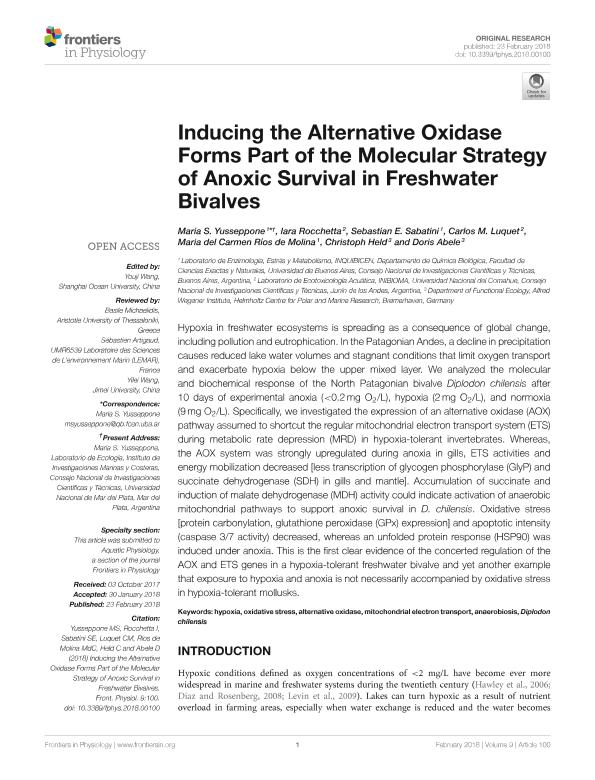Artículo
Inducing the alternative Oxidase forms part of the molecular strategy of anoxic survival in freshwater bivalves
Yusseppone, Maria Soledad ; Rocchetta, Iara
; Rocchetta, Iara ; Sabatini, Sebastian Eduardo
; Sabatini, Sebastian Eduardo ; Luquet, Carlos Marcelo
; Luquet, Carlos Marcelo ; Rios, Maria del Carmen
; Rios, Maria del Carmen ; Held, Christoph; Abele, Doris
; Held, Christoph; Abele, Doris
 ; Rocchetta, Iara
; Rocchetta, Iara ; Sabatini, Sebastian Eduardo
; Sabatini, Sebastian Eduardo ; Luquet, Carlos Marcelo
; Luquet, Carlos Marcelo ; Rios, Maria del Carmen
; Rios, Maria del Carmen ; Held, Christoph; Abele, Doris
; Held, Christoph; Abele, Doris
Fecha de publicación:
23/02/2018
Editorial:
Frontiers Media S.A.
Revista:
Frontiers in Physiology
ISSN:
1664-042X
Idioma:
Inglés
Tipo de recurso:
Artículo publicado
Clasificación temática:
Resumen
Hypoxia in freshwater ecosystems is spreading as a consequence of global change, including pollution and eutrophication. In the Patagonian Andes, a decline in precipitation causes reduced lake water volumes and stagnant conditions that limit oxygen transport and exacerbate hypoxia below the upper mixed layer. We analyzed the molecular and biochemical response of the North Patagonian bivalve Diplodon chilensis after 10 days of experimental anoxia (< 0.2 mg O2/L), hypoxia (2 mg O2/L), and normoxia (9 mg O2/L). Specifically, we investigated the expression of an alternative oxidase (AOX) pathway assumed to shortcut the regular mitochondrial electron transport system (ETS) during metabolic rate depression (MRD) in hypoxia-tolerant invertebrates. Whereas, the AOX system was strongly upregulated during anoxia in gills, ETS activities and energy mobilization decreased [less transcription of glycogen phosphorylase (GlyP) and succinate dehydrogenase (SDH) in gills and mantle]. Accumulation of succinate and induction of malate dehydrogenase (MDH) activity could indicate activation of anaerobic mitochondrial pathways to support anoxic survival in D. chilensis. Oxidative stress [protein carbonylation, glutathione peroxidase (GPx) expression] and apoptotic intensity (caspase 3/7 activity) decreased, whereas an unfolded protein response (HSP90) was induced under anoxia. This is the first clear evidence of the concerted regulation of the AOX and ETS genes in a hypoxia-tolerant freshwater bivalve and yet another example that exposure to hypoxia and anoxia is not necessarily accompanied by oxidative stress in hypoxia-tolerant mollusks.
Archivos asociados
Licencia
Identificadores
Colecciones
Articulos(IIMYC)
Articulos de INSTITUTO DE INVESTIGACIONES MARINAS Y COSTERAS
Articulos de INSTITUTO DE INVESTIGACIONES MARINAS Y COSTERAS
Articulos(INIBIOMA)
Articulos de INST. DE INVEST.EN BIODIVERSIDAD Y MEDIOAMBIENTE
Articulos de INST. DE INVEST.EN BIODIVERSIDAD Y MEDIOAMBIENTE
Articulos(IQUIBICEN)
Articulos de INSTITUTO DE QUIMICA BIOLOGICA DE LA FACULTAD DE CS. EXACTAS Y NATURALES
Articulos de INSTITUTO DE QUIMICA BIOLOGICA DE LA FACULTAD DE CS. EXACTAS Y NATURALES
Citación
Yusseppone, Maria Soledad; Rocchetta, Iara; Sabatini, Sebastian Eduardo; Luquet, Carlos Marcelo; Rios, Maria del Carmen; et al.; Inducing the alternative Oxidase forms part of the molecular strategy of anoxic survival in freshwater bivalves; Frontiers Media S.A.; Frontiers in Physiology; 9; 100; 23-2-2018; 1-12
Compartir
Altmétricas



